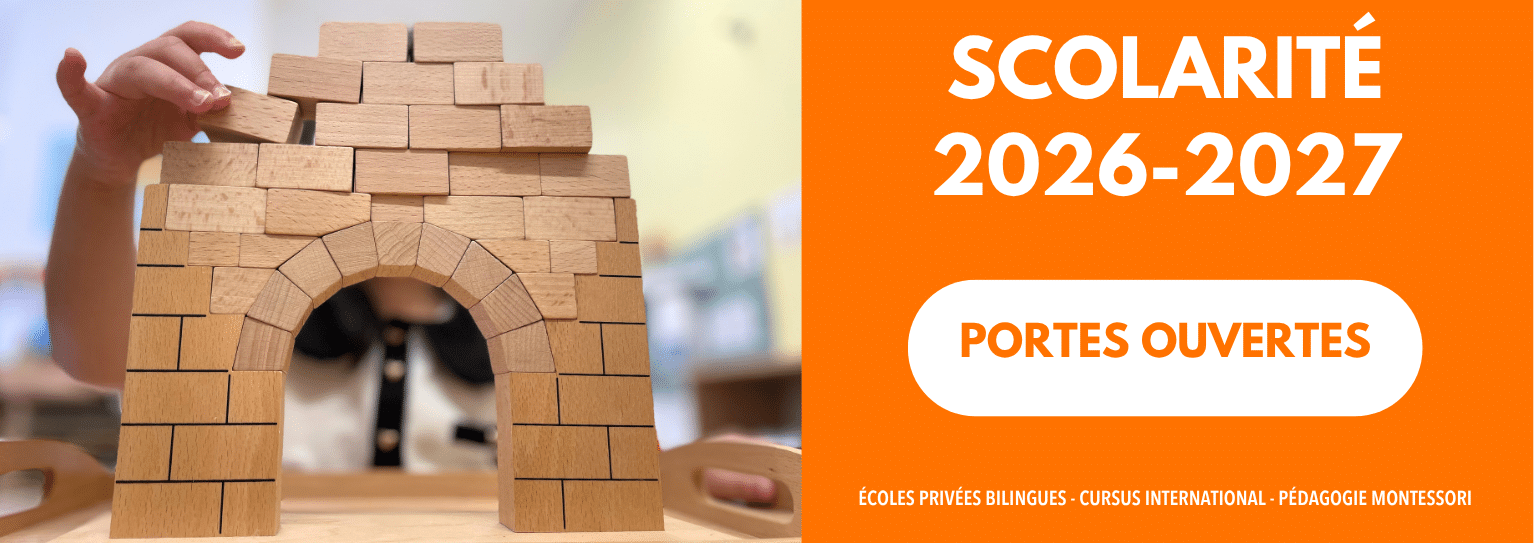
International bilingual elementary school
123 mon école: international schools with a bilingual approach to education
123 mon école welcomes children of all nationalities in an international setting that encouragesopenness to the world.
Every fall, 123 mon école welcomes over 40 nationalities.
In English, as in French, children learn the fundamentals of the national curriculum. The early learning of reading, writing and mathematics is just as important as the social development of our pupils.

Enjoy reading and writing
in both languages
From pre-kindergarten onwards, reading and writing materials, in both French and English, are integrated into the children's daily routine.
From kindergarten onwards, phonemes and graphemes are studied by children, who become little readers.
In elementary school, children consolidate these skills to develop their fluency and comprehension, thanks to tried-and-tested methods that follow the French national curriculum.
The aim is to cultivate both the pleasure of reading and the pleasure of writing.
As well as learning at school, languages also take root in everyday life: in the garden, during meals or extra-curricular activities, constantly enriching vocabulary and syntax in both languages.
Finally, books play a central role at 123 mon école, encouraging a love of words and stories.

Develop scientific
scientific
Our schools combine different pedagogical approaches for math and science, such as Montessori, Singapore, Cambridge and Foss for primary science.
In kindergarten, Montessori activities stimulate logic and reasoning from the age of 2: classification, pairing, counting and associating quantities with mathematical symbols.
Starting in the middle section, children gradually discover the operative systems - addition, subtraction, multiplication and division - moving from the concrete to the abstract with the help of appropriate materials.
In elementary school, the program is enriched by the Singapore and Cambridge methods, offering students a deeper understanding of mathematics. This dual approach- French and Anglo-Saxon - guarantees a superior level of mastery.

An educational team
team
The effectiveness of our educational tool relies on the commitment, skills and experience of our educational team.
Our qualified, enthusiastic teachers accompany each child in his or her development, fostering personalized progress and acaring, culturally-richlearning environment.
Their dynamic approach and expertise in welcoming children from 5 continents means they can respond to the varied needs of their pupils, while cultivating curiosity, confidence and self-fulfilment.
Two teachers per class:
one English-speaking and one French-speaking
Throughout the day, the children are supervised by two educators, one of whom speaks English and the other French.
There is no assistant at 123 mon école. The two educators are teachers who are able to pass on their mastery of Montessori pedagogy and the teaching of English and French.
It also creates a spirit of fairness within our teams.

One language, one person
According to linguists, it's important for a child to identify an adult with a language, if the transmission of a foreign language is to be optimal.
For example, at 123 mon école, teachers keep their own language throughout the day. The children quickly understand the function of each.
If your child speaks French to an English-speaking teacher, the teacher will respond in English. The same is true of the French-speaking teacher, who will respond in French if the child speaks to her in English.
This systemavoids confusion for children and makes it easier to identify the system of each language.
0-6 years, a key age for language learning
Linguists believe that exposure to foreign languages from an early age is a real opportunity for children.
Young children have aunique ability to learn sounds, thanks to their marvellous cerebral plasticity.
Babies as young as 4 weeks old can identify their mother's voice.
Children can differentiate between different languages until about 10 months of age, when they gradually begin to specialize in one language.
Throughout their growth, with a particularly propitious window between the ages of 0 and 6, children possess great learning capacities, and not just for languages...
Questions parents have about bilingualism...
What are the families
of123 mon école ?
Expatriate families looking to teach their children the French language, while continuing to learn English.
French families returning from expatriation who are looking to continue the wonderful experience of immersion in the English language, while retaining the richness of an international environment.
French families who want to immerse their children in a bilingual, multicultural environment.
My child doesn't speak
a word of English!
This is common at 123 mon école. Children who do not speak English may initially approach the French-speaking teacher.
French is not absent from the children's daily lives. It circulates freely with English throughout the day.
If my child doesn't continue learning English as assiduously in elementary school, what will be left of this bilingual experience?
If your child stops learning English in elementary school, but then picks it up again, he or she will find a fertile ground. Sounds already known and stored in his memory will gradually come back to him. Like gymnastics, the memory reactivates familiar sounds, facilitating pronunciation and overall understanding of the language.

Would you like to know more about simultaneous language acquisition?
Find out more by tuning in to our webinar on bilingualism, hosted by a linguist.
Please add an image


